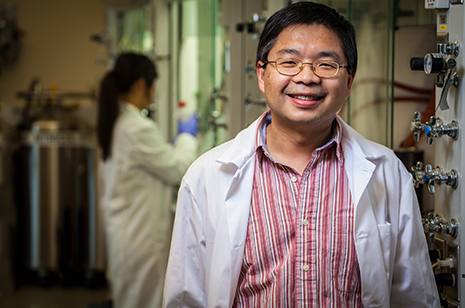FAYETTEVILLE, Ark. – Nan Zheng, an assistant professor of chemistry at the University of Arkansas, has received a $550,000 Faculty Early Career Development Program award through the National Science Foundation to further his research in chemical reactions sparked by visible light.
Specifically, Zheng is investigating the development of environmentally sustainable methods for amine synthesis. The class of organic compounds known as amines is an important building block for pharmaceuticals.
Most organic compounds can’t readily absorb visible light. Instead, organic chemists typically rely on ultraviolet, or UV light, which has disadvantages in photochemistry, a branch of chemistry concerned with the chemical effects of light. Zheng and his research team use visible light from commercial fluorescent light bulbs and light-emitting diodes (LEDs) to promote chemical reactions. Zheng calls this process “green” or “sustainable” chemistry.
“In sustainable chemistry, we want to create new reactions so that we can create a new molecule,” Zheng said. “There is a lot of room here to discover new reactivity, in addition to the green nature of this whole process.”
Zheng is particularly interested in challenges in processing new reactivity of amines.
“There is a problem with using visible light, which excites and moves electrons around to make the chemistry occur; most amines cannot absorb visible light efficiently,” he said. “We are zeroing in on using a catalyst to funnel the energy of the visible light to the amine.”
Zheng’s research team uses ruthenium and iridium complexes, metals bound to organic molecules that are active in the presence of visible light, as catalysts to promote chemical reactions in a range of organic molecules, including amines, which are common in bioactive compounds and pharmaceuticals.
Their preliminary research has shown that using visible light as an energy source with these catalysts has created new chemical reactions in amines, Zheng said.
“The neutral amine molecule is the starting material and it is unreactive to visible light,” he said. “Upon oxidation, which is the loss of one electron in the amine, it is converted into an amine radical cation, which is very reactive and then triggers reactions leading to new molecules that can be potentially used in drug discovery. The end product is potentially useful.”
Under the NSF grant, Zheng seeks to continue developing more new reactions through this type of green chemistry.
The five-year grant, better known as a CAREER award, is one of the highest honors given by the foundation to junior faculty members. Recipients are selected based on high-quality research and the integration of that research with education initiatives in the context of the university’s mission.
The CAREER award will support tuition assistance and assistantships for Theresa Nguyen and Jiang Wang, doctoral students who assist with Zheng’s research in his laboratory. It will also pay for initiatives planned by Zheng to help teach organic chemistry to undergraduate students.
A full list of U of A faculty who have received CAREER awards can be found here.
Topics
Contacts
Nan Zheng, assistant professor, chemistry and biochemistry
J. William Fulbright College of Arts and Sciences
479-575-5078,
Chris Branam, research communications writer/editor
University Relations
479-575-4737,
